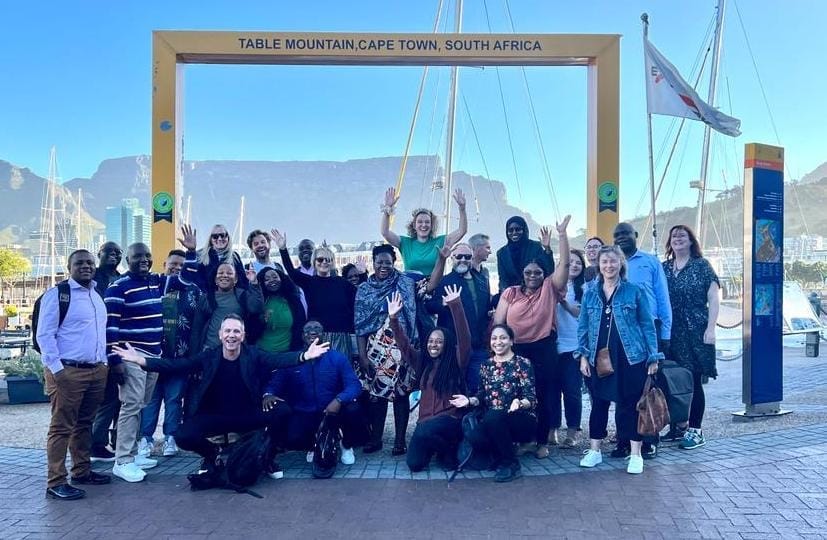Where the trendy farmers hang out
From farming to Cop28; plastic waste campaigning to addressing childhood eco anxiety - we've got it all for you today. Just relax and enjoy a slow Sunday read
Good morning! I’m Sarah Hartley and this is The Northern Eco’s recently launched Sunday read from across the globe, The Planet on Sunday. As you’ve received this newsletter then either you subscribed, or someone forwarded it to you. If the latter, then you can click on this handy little button below.
Talking climate, farming and journalism with Ivor Price
Farmers in South Africa are on the frontline of dealing with the effects of climate change, in common with many countries in the global south. Africa produces less than 4% of the greenhouse gases that are thought to lead to climate change, yet continental Africa is expected to be the most affected. As co-founder Ivor Price tells me, it’s an issue that the agriculture publication and farming movement, Food For Mzansi, deals with every day.
“South Africa is experiencing severe weather pattern changes. Just earlier this year, in KwaZulu-Natal, for example, one morning, heavy rains swept away the neighbourhoods and farmlands, and the floods destroyed everything. It's also one of the driest countries in the world. On the list of driest countries, it ranks 31st in the world. Researchers now say we've got enough rain for weeds, but it's insufficient for crops. So lots of dry spells, intense rainfalls, and heatwaves. It's problematic. It's what the farmers face daily.”
Set up five years ago, Ivor’s business is well-placed to witness these changes. Operating in a sector which primarily identified farming as something 40,000 landowning white people were involved in, he and his business partner/best friend Kobus Louwrens looked at the data. They saw nearly two million, primarily black, small-scale farmers, who weren’t represented.
Food For Mzansi now describes itself as The New Face of South African Agriculture and is dedicated to the unsung heroes of the agricultural industry. The website proudly declares:
“We unashamedly share success stories and good news from the farms and agri-businesses who feed South Africa. We believe in the power of agriculture to promote nation-building and social cohesion by telling stories often overlooked by broader society.”
Let’s have breakfast!
Ivor and I are discussing climate, farming and journalism over breakfast at the Protea North Wharf Hotel in Cape Town. We met up at this unusual location as we were both participants in the UCLan Journalism Innovation and Leadership programme, hosting a week-long intensive design sprint for news professionals across Europe and Africa. (More on that at the Happy Journalist).
The food is of the international hotel variety - everything from freshly cooked omelettes to salads and stir-fries. Still, we settled for our chat with an odd assortment of cheese, pastries and fruit. The country’s abundance of local produce is less evident, and sitting among the skyscrapers of the city’s business district, I wondered how farming is regarded in the broader society. Are people still very connected to the land and food production? Ivor’s answer surprised me!
“Farming is very trendy at the moment, partly due to influencers. Many of them have taken to social media, and they build huge social media followings. I mean, I went into a local clothing store just last week. They're selling ‘farmer ware’ where dressing up kids is trendy, and people are doing video stories about farmer-styled weddings.”
What do these trendy farmers grow?
“COVID-19 brought a greater appreciation for understanding where your food comes from. South Africa likes boasting that we are food secure at a national level, which we are, but COVID-19 showed us that when stuff goes wrong, we need to get food from a much more local source.
“There’s a broad spectrum of crops, which differs by province and geographical location. So, if you're in the Western Cape, it traditionally would be sunflowers, which we use for canola oil. But the main crop for years is grapes, it's wine country. We go up north, and it's cattle, maize, and vegetables, and we also find the emergence of cannabis farming. Cannabis production is legal, and the government has also put it into our national master plan. So, the country's 2030 vision has identified cannabis hotspots.
“Just recently, I wrote a story about a bunch of rural Eastern Cape cannabis growers who, for decades, used to fight with the law, and many of them have criminal records because they were growing this crop in the cannabis belt. Now, all of a sudden, it's legal and creating employment - it should create mass employment by 2030. Is the kind of thing where all of a sudden government ministers want to take pictures with cannabis growers.”
Given the change mentioned in weather patterns, how are the farmers adapting?
“Scientists are stepping in to promote what they call drought-resistant crops. It is so important for countries like Ethiopia, for example, where people have had droughts for decades, but of course, the adoption they have is problematic.
“We are finding considerable resistance to GMO crops among our audience. A lot of it is based on religion when science shows it is actually among the safest. People are saying it's worse than colonisation. Some feedback is against buying these seeds from a corporation, and there is enormous resistance to biotechnology. It’s a pushback to the science, which I think is based on ignorance, especially with rural farmers who have no education levels and who are scared of organised agriculture taking over their lives. I think it could be a game changer for many of them, but we've got some serious issues to address.“
Where does regenerative farming fit in?
The changing climate is also seeing the emergence of different crops and farming methods and approaches. Regenerative agriculture is a holistic farming approach that aims to improve soil health, enhance biodiversity, and promote ecological resilience while producing food. The basic principle of regenerative agriculture is to work with natural systems rather than against them. Was this factor important?
“What we find in the South African farming space is that the regenerative agriculture movement is exploding. There's a big conservation farming drive. In fact, we've just done a television show about six farmers who have been doing it for decades. Nobody thought it would work when they started, and the neighbours thought they were crazy. And now, when climate change is getting real, they're reaping the benefits.
“Of course, it's easier to do if you have capital, as it takes a few years before you start making money, and most small-scale farmers can't afford that. But they are starting to implement some of the practices - no turning, for example, you know, allowing land to rest rotational crops so the one year you plan X and the next year you plan Y now it's almost become a swear word also to burn your fields with farmers.”
Journalism for social good
The week-long journalism leaders event was the first time Ivor and I had the opportunity to meet in real life, although we’ve been in contact for many years due to my previous work with the Google News Initiative.
With 15 global awards under its belt in the first four years of its existence, Food For Mzansi has already had a significant impact in this sector and is seen as a pioneer in the news industry. Ivor is a man with a plan, not one to rest on his laurels. So what next?
“We're also exploring the cross-section between agriculture, food and health, so we've launched the little baby called Health for Mzansi. She's also just over a year old now and is a Gen Z publication that looks a bit like Instagram. It's always been a bit of a no-brainer with the health and food links, and also, we love disrupting. It doesn't make us popular, but we believe more people should be disrupting the traditional media space.
“So we believe a good shake-up is good for everyone and also in the health market. Healthier, health news - it shouldn’t be just for skinny people. Check the magazines. All fitness freaks rate those newspapers with their Fitbits, and that's it. It's lovely, but we don't write for those people. Our authors answer specifically for people in townships who take taxis (small buses) to work and who can't afford expensive, healthy food. We show them healthier ways.”
Food for Mzansi is online at www.foodformzansi.co.za.
🌿 I’ll be back as usual on Tuesday with environmental news closer to home including a catch up with one of the most determined campaigning women I’ve had the pleasure to speak with.
📚 This newsletter continues below for paid subscribers. If you’re not ready to subscribe, fear not, there’s a scheme to help. It would mean the world to me if you invited friends to subscribe and read with us so you’ll be rewarded with freebies if you do!
How to participate
1. Share The Northern Eco. When you use the referral link below, or the “Share” button on any post, you'll get credit for any new subscribers. Simply send the link in a text, email, or share it on social media with friends.
2. Earn benefits. When more friends use your referral link to subscribe (free or paid), you’ll receive special benefits.
Get 1 month free for 3 referrals
Get 3 months free for 5 referrals
Get 6 months free for 25 referrals
Five ways to follow Cop28 online
Keep reading with a 7-day free trial
Subscribe to The Northern Eco to keep reading this post and get 7 days of free access to the full post archives.






